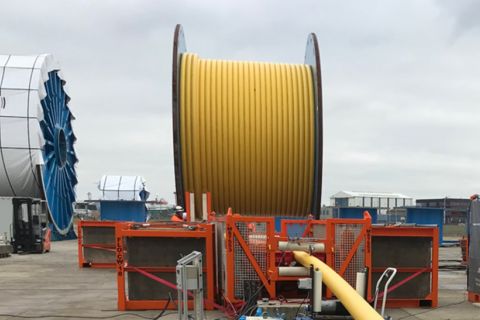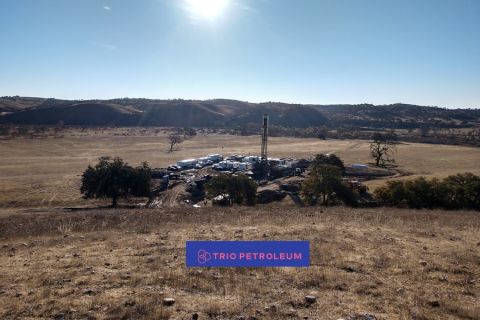Learn more about Hart Energy Conferences
Get our latest conference schedules, updates and insights straight to your inbox.
Like “toh-MAY-toe, toh-MAH-toe,” there are a multitude of theories on the best way to get ketchup out of a glass bottle and on your fries. I personally find that when the repeated tapping of the sweet spot on the bottle’s neck doesn’t work, stabbing a knife down its throat to get the sweetly sour tomato paste flowing can be strangely satisfying.
But a new coating cooked up in a laboratory at MIT ensures slippery times ahead for the “sticky problems” that perplex us all. The coating, dubbed LiquiGlide, was developed in the Varanasi Research Group laboratory at MIT. David Smith, a Ph.D. student in the laboratory, was trying to solve the problem of hydrate buildup in pipelines by using liquid-impregnated slippery surfaces. After seeing some success, the team began looking at other areas the food-safe coating could be used.
First up was ketchup. Smith found that a compound isolated from ordinary vegetable oil could create a slip-and-slide for the condiment, leaving no wasted residue inside the bottle, according to an October 2014 Boston Globe article. With a small change, a similar liquid layer would work with hair gel, he found, and a different tweak worked best with yogurt. Smith quickly built up a library of materials, combinations of which dislodge any sticky fluid or gel from inside a container. All the coatings are extracted from edible products you encounter in a grocery store, the article said.
To demonstrate the coating’s effectiveness, Smith created a video showing ketchup flow out of the bottle, leaving no residue behind. That video went viral and triggered “thousands of inquiries from consumer packaged goods manufacturers looking to use the technology,” the LiquiGlide website stated.
Kripa Varanasi, a professor and principal investigator in the Varanasi Research Group at MIT, presented on the LiquiGlide technology as part of the “Energy Outlook and Future of Innovations for Deep Water in a Cost-Competitive Environment” panel at this year’s Offshore Technology Conference in Houston.
Robert Armstrong, director of the MIT Energy Initiative (MITEI), kicked off the panel with a look at the future of fossil fuel resources. He noted that basic energy research is the beginning of innovative change. Another is transitioning the innovations from the laboratory to more commercial applications via startups. The MITEI, he said, has funded more than $600 million in energy projects. LiquiGlide is one such startup, demonstrating how basic energy research is making the transition from laboratory experiment to commercial success.
The applications are limitless for the wonder coating. According to the company, its coatings can “help the oil and gas industry save billions of dollars by enabling viscous liquids to flow more easily, reducing costly waste and improving the reliability of the infrastructure.”
One area of enablement would be in heavy oil transport, with use of the Liqui-Glide coating eliminating the need to dilute or heat the bitumen to get it to flow. Hydrate inhibition in pipelines is another. The coating also works as a protective layer, helping to reduce the rate of corrosion, the formation of scale and the buildup of deposits on surfaces that can clog pipelines, according to the company.
Now that it has helped solve important dilemmas like heavy oil transport and corrosion prevention, perhaps the laboratory for its next project can investigate better ways to spread cold butter on cold bread without tearing it apart? I’m sure there’s an industry-specific application somewhere to justify the research.
Recommended Reading
Exxon Mobil Guyana Awards Two Contracts for its Whiptail Project
2024-04-16 - Exxon Mobil Guyana awarded Strohm and TechnipFMC with contracts for its Whiptail Project located offshore in Guyana’s Stabroek Block.
Deepwater Roundup 2024: Offshore Europe, Middle East
2024-04-16 - Part three of Hart Energy’s 2024 Deepwater Roundup takes a look at Europe and the Middle East. Aphrodite, Cyprus’ first offshore project looks to come online in 2027 and Phase 2 of TPAO-operated Sakarya Field looks to come onstream the following year.
E&P Highlights: April 15, 2024
2024-04-15 - Here’s a roundup of the latest E&P headlines, including an ultra-deepwater discovery and new contract awards.
Trio Petroleum to Increase Monterey County Oil Production
2024-04-15 - Trio Petroleum’s HH-1 well in McCool Ranch and the HV-3A well in the Presidents Field collectively produce about 75 bbl/d.
Trillion Energy Begins SASB Revitalization Project
2024-04-15 - Trillion Energy reported 49 m of new gas pay will be perforated in four wells.





